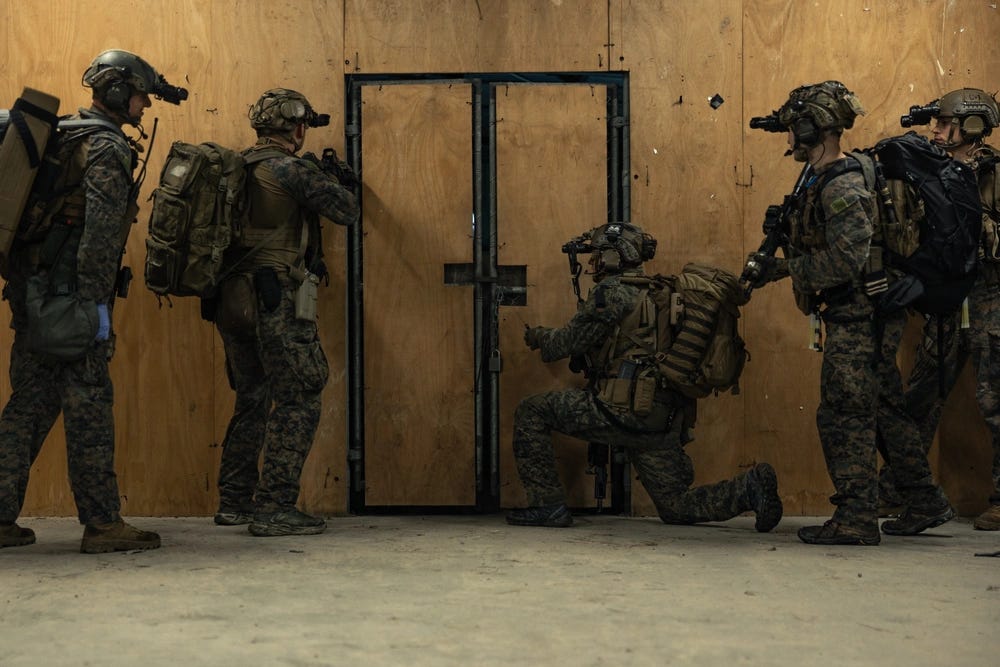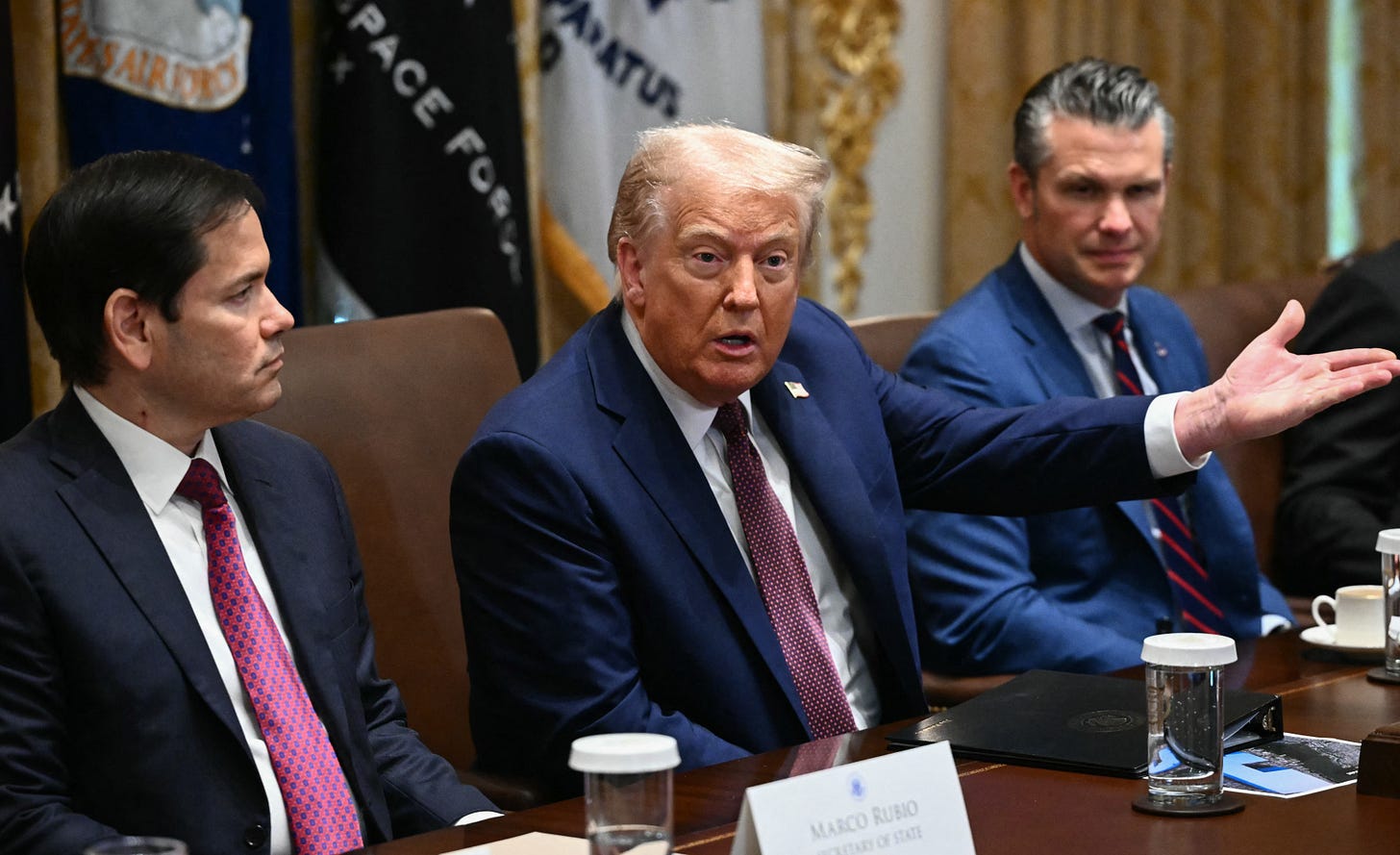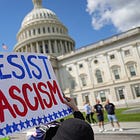Cartels Are Bad But They're Not 'Terrorists.' This Is Mission Creep
Trump using the military to solve every problem is a backward step.
An earlier version of this analysis first appeared in Responsible Statecraft. Zeteo is republishing it with its permission.

There is a dangerous pattern on display by the Trump administration. The president and Secretary of Defense Pete Hegseth seem to hold the threat and use of military force as their go-to method of solving America’s problems and asserting state power.
The president’s authorization for the Pentagon to use US military warfighting capacity to combat drug cartels – a domain that should remain within the realm of law enforcement – represents a significant escalation. This presents a concerning evolution and has serious implications for civil liberties – especially given the administration’s parallel moves with the deployment of troops to the southern border, the use of federal forces to quell protests in California, and the recent deployment of armed National Guard to the streets of our nation’s capital.
Last month, the Pentagon sent three guided-missile destroyers to interdict drug cartel operations off the coast of South America, giving the US Navy unprecedented counternarcotics authority and foreshadowing a potential military stand-off against Venezuelan President Nicolas Maduro, who is wanted by the United States on charges of narco-terrorism. There are now seven US warships, as well as a nuclear-powered submarine, in the region or on the way.
In an acute escalation of force, on Tuesday, the Pentagon carried out a strike against a small speedboat traveling in international waters – destroying the vessel and killing all 11 on board. President Trump stated the boat was transporting illegal narcotics and declared that those killed were “narco-terrorists” and members of the Tren de Aragua cartel. Secretary of Defense Hegseth justified this designation, calling the cartel an organized terrorist group whose objective is to “poison our country with illicit drugs.” Secretary of State Marco Rubio echoed this sentiment, saying, “When you flood American streets with drugs, you are terrorizing America.” These developments have been paralleled by Trump’s recent proposals to deploy US military forces on the ground against drug cartels in Mexico.

Such efforts are not new. Trump and the GOP have increasingly called for US military interdiction against Mexican drug cartels under the banner of counterterrorism. During his first administration, Trump seriously considered launching strikes at drug labs in Mexico in an effort that was successfully shut down by then-Secretary of Defense Mark Esper.
But there are no such guardrails in the new Trump administration, and the rhetoric has progressively crept toward the use of US special operations, specifically. During an interview on Fox News in November, incoming Border Czar Tom Homan announced that, “[President Trump] will use the full might of the United States special operations to take [the cartels] out.”
If that is indeed the direction the administration wants to go, it has taken swift action to set plans into motion, starting with an executive order on day one that designated cartels as foreign terrorist organizations – thus opening a Pandora’s box of contested legal authority to use military force, which we now see unfolding. On signing the order, President Trump acknowledged, “People have been wanting to do this for years.” And when asked if he would be ordering US special forces into Mexico to “take out” the cartels, Trump replied enigmatically, “Could happen … stranger things have happened.”
The executive order upholds that drug cartels “operate both within and outside the United States … [and] present an unusual and extraordinary threat to the national security, foreign policy, and economy of the United States.” It declares a national emergency under the International Emergency Economic Powers Act. The specificity of both “within and outside” the US, combined with the declaration of a national emergency, is perhaps the first step toward the broader use of executive power to deploy military forces in counternarcotics operations not only within Mexico and across Central and South America, but potentially the United States too.
To be sure, the Trump administration is already testing the limits of Posse Comitatus – the law that prevents presidents from using the military as a domestic police force – by invoking questionable authorities to use National Guard and active duty troops during the counter-ICE protests in California and, most recently, to declare a “crime emergency” in Washington, DC, federalizing the police force and deploying troops to patrol the district’s streets. Reports suggest the administration is preparing to do the same in Chicago.
The operations in South America are likely just the beginning. If the US military were to engage in Mexico, the most likely forces to execute would be a task force under the US Army’s 7th Special Forces Group, whose area of responsibility includes Central and South America, or a specialized task force under the Joint Special Operations Command. Additionally, any task force would have robust air and naval capabilities at its disposal.
Historically, along with past administrations, Trump has been inclined toward the use of special operations forces as his default problem-solver. Hegseth has amplified the same proclivity, noting at an industry forum in May that the presidentially-directed use of special operations forces has increased exponentially in the past three years and will only continue, pledging a significant increase in funding for the US Special Operations Command.
Under both Authorizations for the Use of Military Force (2001, 2002) to counter global terrorism, recent presidents, including Trump, have enjoyed an incredible level of authority to unilaterally deploy US military forces for crises or other contingencies without congressional approval. Because of their relatively low troop footprints and the ability to accomplish targeted and short-duration missions (creating a convenient perception of limited military involvement), special operations forces are often preferred.
The prospect of using military force in counterdrug operations under the banner of counterterrorism is not only legally debated, it is doctrinally unsound. The Department of Defense defines terrorism as “the unlawful use of violence, or threat of violence, often motivated by religious, political, or other ideological beliefs, to instill fear and coerce governments or societies in pursuit of goals that are usually political.” This is paralleled by the FBI’s definition of terrorism. However, there is no evidence that America’s illicit drug problem is driven by anything other than the pursuit of profit on the part of disparate criminal organizations and individuals – fueled by the desire and demand for illicit drugs on the part of the millions of Americans consuming them. Therefore, America’s drug problem, as concerning as it is, does not meet the United States’ own definition of terrorism.
While there are malign actions on the part of the cartels that parallel activities committed by terrorist organizations – such as the use of violence and intimidation against the civilian populace, government officials, and military and law enforcement – the overriding motivation of drug cartels is not inherently political, or religious, or ideological in nature. Rather, it is largely financial. As with many other categories of criminal activity, illicit drug activity must remain within the domain of law enforcement, and any undermining of government authority by drug cartels is done mainly in the interest of securing profit.
This is a very important delineation when contemplating the use of American warfighters. During the “War on Terror,” US forces conducted counterdrug operations across the Middle East. I was directly involved in counternarcotics activities against both the Taliban and ISIS-K as a part of the Special Operations Task Force - Afghanistan. However, these forces carried out operations to directly fund terrorist activities toward the deliberate, ideologically- and politically-driven aim of overthrowing state governments.
Equally important, the Mexican government has made it clear that the deployment of US military forces within Mexico is neither desired nor welcomed and would be considered a violation of Mexico’s sovereignty. Mexico already collaborates with US federal law enforcement in its fight against the drug cartels. Similar has been echoed by the Venezuelan government, where the US Drug Enforcement Agency works bilaterally to combat drug trafficking across the entire Andean region.
As I recently told The Intercept, rather than deploying special operations forces to conduct the kind of activities that would likely lead to full-scale counterinsurgency conflict – with US forces directly entangled – we should instead nourish long-standing law enforcement partnerships. This would be the most legally appropriate and strategically sound course of action, both diplomatically and in the interest of regional security.
The Trump administration’s eagerness to deploy the US military in increasingly expanded capacity is even more alarming considering Hegseth’s rhetoric about American warfighters being solely for the use of violent force – or what he so often refers to as ‘lethality.’ What would the rules of engagement be for US forces sent into Mexico or Venezuela, especially at the objection of their governments? What would the long-term implications be for security and stability across the region?
The strict separation of a nation’s military from its law enforcement is a vital aspect of any democracy.
And how far will we then be from this administration doing the same on American soil? Armed soldiers are already patrolling the streets of DC, and Trump has threatened to federalize the National Guard for deployment in other cities. He has voiced a willingness to invoke the Insurrection Act to use military force within the United States and, during an interview in October, warned that the “enemy from within … should be very easily handled” by the military. Rubio recently confirmed, “We’re going to take on drug cartels wherever they are and wherever they’re operating against the interests of the United States,” and said that the only thing that will stop drug cartels is “when you blow them up, when you get rid of them.”
What would the rules of engagement be for special operations task forces on missions in American neighborhoods? I spent a career as a special operator conducting countless raids and kill/capture operations against high-value targets across the Middle East, and I recently left the Pentagon in a role that saw me intimately involved at a high level in US special operations activities. Trust me when I say that – as awesome and capable as our elite forces are – US special operations should not be unleashed on America’s streets unless there is an actual war to fight.
The strict separation of a nation’s military from its law enforcement is a vital aspect of any democracy. Especially for the United States and even more so if we are to maintain any commitment to being the “leader of the free world.” If we head down the treacherous path of designating any group or individual person that commits a crime, or even an act of violence, as being part of a terrorist organization in order to justify the use of America’s warfighting capacity, we will find ourselves as a nation falling even further toward militarization and authoritarianism.
Wes J. Bryant is a former senior targeting adviser and policy analyst at the Pentagon, where he served as chief of civilian harm assessments. He is a retired master sergeant and special operations tactical air controller in the elite special warfare branch of the U.S. Air Force and co-author of the book, Hunting the Caliphate: America’s War on ISIS and the Dawn of the Strike Cell.
Check out Responsible Statecraft for more analysis like this.
ICYMI - See more from Zeteo:






Maybe the word "terrorist" should be banished from public discourse. It's been used to describe everything from little children slogging through the Darien Gap to mules trying to navigate open ocean in speedboats. Now it means nothing, as politicians try to evoke subconscious images of planes barreling into skyscrapers every time a petty crime happens. Enough!
Here's an honest question - is there any proof this even happened at all?
As far as I know, no names have been released, the US has given next to no details, and what little has been offered has been inconsistent and contradictory... and as far as I know, so far the Venezuelan government has not even confirmed anything, except for one official I found who said he thought it was AI.
I am not one for conspiracies, but there hasn't been any proof offered at all these thee boat was full of drug dealers, or who was one the boat at all..or even if anything actually happened.